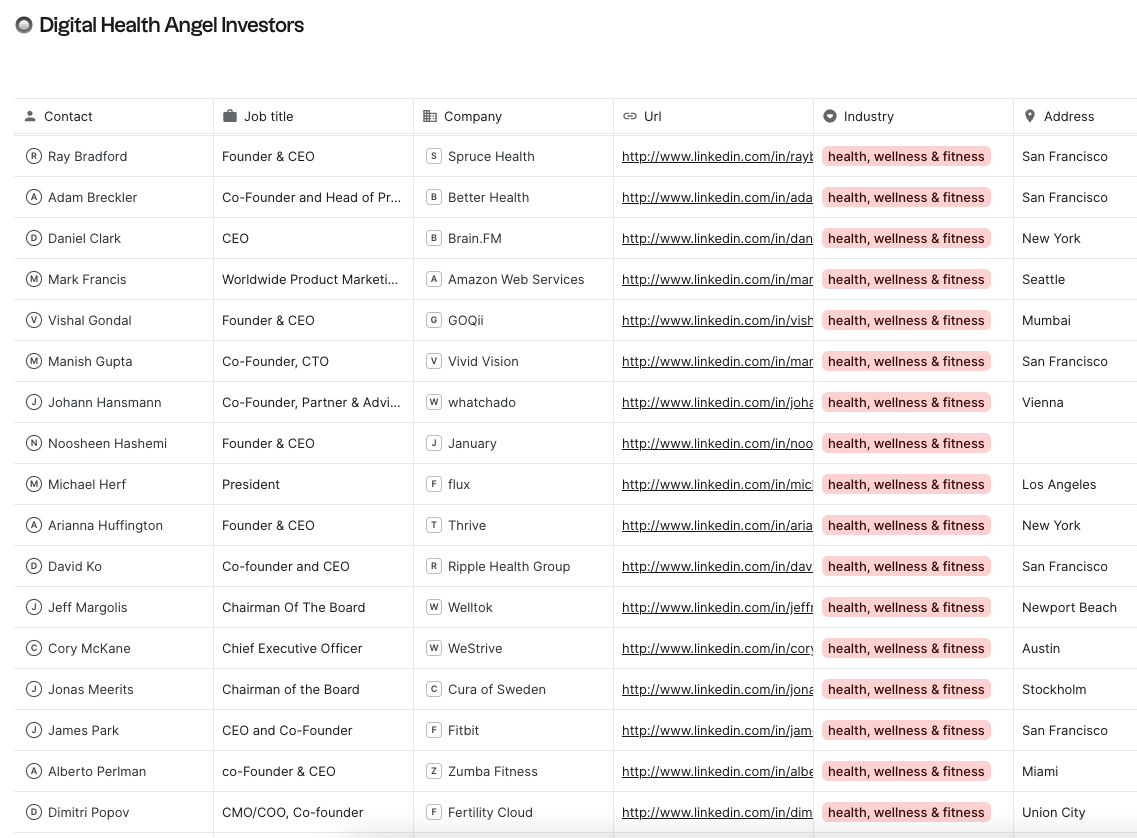Discover folk - the CRM for people-powered businesses
As a startup or established business operating in the digital healthcare space, finding investors who not only understand the industry but are also willing to invest in your vision can be challenging. While there are plenty of venture capitalists out there, angel investors can be a great source of capital as well. They not only provide funding but also bring a wealth of experience and expertise to help grow your business.
Get the full list of digital health angel investors here. You can duplicate it with one click.
👉🏼 Try folk now to duplicate this digital health investor list into your CRM and kick off targeted outreach in minutes

In this blog post, we'll introduce you to the prominent angel investors in the digital health space who have made a name for themselves by backing some of the most innovative and successful companies in the industry. We'll also share tips on how to approach angel investors.
Angel investors in Digital Health

Arianna Huffington
Best known for founding the Huffington Post, Arianna has now set her sights on creating health and wellness startups. Her VC firm, Thrive Global, focuses on investing in companies that help people in their daily lives, both physically and mentally. Thrive Global has backed several digital health startups, including Lyra Health, Hims, and Welltok. Arianna's interest in digital health was sparked by her own health issues, and she believes that technology is an integral part of the future of healthcare.

Tim Wesselman
Wesselman has made a name for himself by investing heavily in telemedicine startups. He sees the potential for digital health solutions to transform the traditional healthcare model by reducing costs, improving access and patient outcomes. Wesselman's VC firm, Numenor Ventures, has invested in MDLive, HealthTap, and Teladoc, to name a few. Wesselman believes that telemedicine is a win-win for both patients and healthcare providers and will continue to grow in popularity.

Varsha Rao
Rao has an impressive background in tech startups, having served as the CEO of Nurx and head of operations at Airbnb. Her investment focus is on mental health and wellness startups that have the potential to make a real impact. Her VC firm, Nurture Capital, has backed several interesting companies, including Maven Clinic, Modern Health, and The Bright App. Rao believes that mental healthcare has long been neglected and that a dedicated focus on the issue is necessary.

Rajeev Singh
Singh has invested in a variety of healthcare startups, from digital health coaching to wearables. His investments focus on companies that address problems in healthcare that have been underserved or overlooked. Singh's VC firm, Khosla Ventures, has invested in Ginger, Omada Health, and Biofourmis, among other companies. Singh recognizes the complexity of healthcare and aims to support startups that can navigate the intricacies of the industry.

Noosheen Hashemi
Hashemi has a passion for digital health startups that have the potential to make a real impact in people's lives. Her investments focus on early-stage startups that are disrupting traditional healthcare models. Her VC firm, The H Fund, has backed several companies, including HeartFlow, ChromaCode, and Niramai. Hashemi believes that technology is changing the way we approach healthcare, and that startups that leverage the latest innovations will be most successful.
8 steps to approaching angel investors in digital health
Approaching angel investors is a critical step in any venture capitalist's journey. When it comes to digital health, having an understanding of the industry, as well as making sure your pitch meets the criteria of potential investors is essential. Be sure to research the investor thoroughly before approaching them and have a well-crafted pitch that outlines what makes your startup unique and how it can make an impact in the market. Additionally, emphasizing the ways you plan to monetize will be helpful for securing investment. Finally, understanding the trends within digital health—including those related to privacy regulations—will help investors feel confident in your ability to succeed in the space.
1. Identify angel investors that align with your mission
It's important to identify investors who share a similar vision and are willing to invest in digital health startups. Contacts can be found all over the web, and it's important to store them in an organized CRM system, such as folk.
2. Craft an elevator pitch
Create an effective story that outlines the value of your company and why it is worth investing in.
3. Research potential angel investors
Use different tools such as Crunchbase, AngelList, or VCUniverse to research potential investors and assess their portfolios. folk's handy Chrome extension lets you instantly add contacts straight into your folk CRM, without even needing to open it.
4. Prepare a comprehensive pitch deck
Put together a professional presentation that showcases your product, team, market opportunity, financials, and other relevant information about your startup.
5. Create connections with angels
Reach out to angel investors to introduce yourself and your startup. In folk you can send bulk emails to entire lists of angels, while automatically personalizing each email to the recipient.
👉🏼 Try folk now to send personalized bulk emails to angels and track every reply and follow-up in one place
6. Nurture relationships with angel investors
Keep in touch with your network of angel investors and provide updates about your progress to maintain relationships and build trust. You can easily keep track of all your angel investors and interactions with them in folk.
7. Understand digital health trends
Stay up-to-date on the latest industry developments, including those related to privacy regulations, so that you can demonstrate that you are knowledgeable when speaking with potential investors.
8. Structure a deal that works for all parties involved
Negotiate terms and structure a deal that works for both you and potential investors so that everyone is happy with the outcome.
With these approaches, more and more companies are entering into digital health, raising its overall popularity.
Conclusion
Investing in digital healthcare is not for the faint of heart. It requires an understanding of healthcare laws, compliance requirements, and complex technologies. That's why having an angel investor with experience in the industry can make all the difference for your startup. These five angel investors are some of the most prominent, knowledgeable, and forward-thinking in the digital health space. By choosing one of these investors to back your startup, you'll not only gain access to funding but also their unique expertise and insights, which can help move your company forward.
FAQ
How much do you pay an angel investor?
You don't pay angels salaries or fees. They invest for equity (or a SAFE/convertible note). Angels earn when equity appreciates, on conversion, exit, or dividends. There are no scheduled repayments unless a note specifies interest and maturity.
How do you find angel investors for digital health startups?
Start with sector-focused angels, accelerators, and groups; scan portfolios on AngelList and Crunchbase; tap operator and clinician networks. Build a targeted list and seek warm intros. Track outreach and follow-ups in a CRM like folk.
What do angel investors look for in digital health?
Clear problem, strong team, clinical or real-world evidence, regulatory and privacy compliance, viable reimbursement or go-to-market, traction and unit economics, and a credible path to scale.
How should a digital health startup approach angel investors?
Research each investor's thesis, tailor a concise deck, highlight problem, outcomes, business model, regulatory plan, and milestones. Specify the ask (amount, instrument, use of funds), request feedback, and follow up with updates and social proof.
Discover folk CRM
Like the sales assistant your team never had


